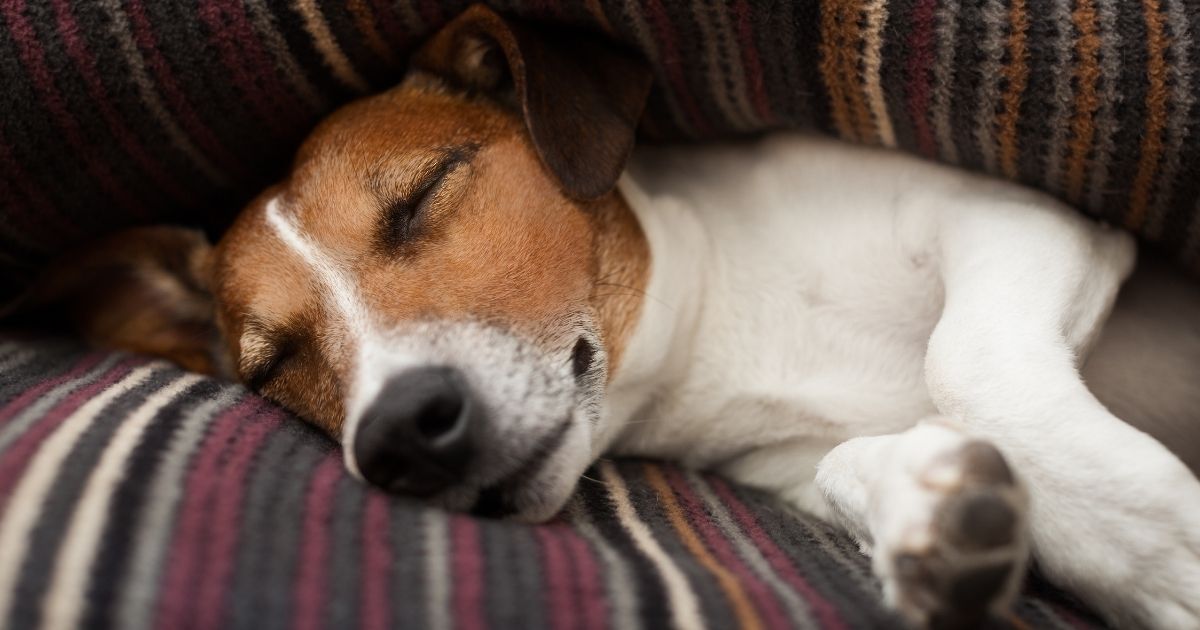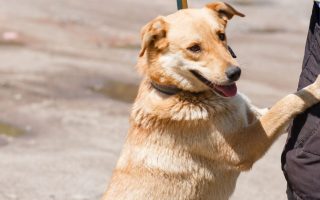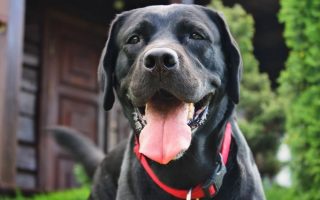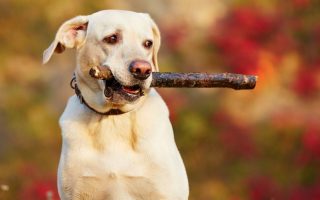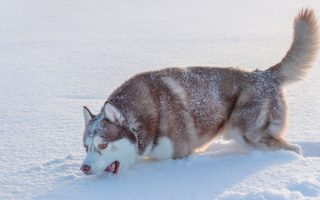It happened a fortnight ago; it’s happening again — you’re waking to the peeve of your dog growling, twitching, whining, whimpering, and barking in its sleep.
Perhaps you’ve noticed more dramatic vocalizations and movements that have made you worry about these bizarre sleep behaviors.
This cause of concern might have inspired questions left unanswered, like why does your dog bark when it sleeps?
Is sleep-barking a threat to your dog? Is it a trick to get you out of your bed? What can you do to stop this habit?
Well, you can put your worries to rest as we’ll be discussing the reasons why dogs bark in their sleep in the following paragraphs.
Why Do Dogs Bark in Their Sleep?
It might be comforting to know that a dog barking in its sleep is entirely normal in canines, while it seems out of the ordinary.
Your dog’s brain is structurally similar to yours, and you can expect similar behavioral traits inspired by emotional and social involvements. [1]
These vocalizations and body movements inspired scientists to study a dog’s brain activity during sleep, realizing that its waves are like a human’s.
As humans, what you might have is your furry companion dreaming.
These dreams range from pleasant imaginations to terrifying nightmares.
When dreaming, dogs use all of their senses, explaining the reason behind the growling, twitching, whining, barking, wiggling ears, twitching eyelids, wagging tails, and paw movements.
It wouldn’t be wrong to say that our four-legged friends act out their dreams.
While dreaming is the best guess as to why dogs bark in their sleep, there could be other reasons, including anxiety, pain, allergic reaction to drugs, sudden noise, and excitement.
1. Anxiety
A night of peaceful sleep is a luxury that a dog suffering from anxiety cannot afford.
A dog can develop anxiety toward a specific person or animal, especially in a new environment or under unusual circumstances.
This can result in a sleeping disorder that can cause it to bark in its sleep out of fear or distrust.
Separation anxiety due to neglect can also cause anxiety-related sleeping disorders in dogs.
2. Pain from an Injury
A dog whimpering in its sleep can be likened to a human shrieking upon hitting an open wound on the edge of the bed.
Perhaps your dog has turned on its sore paw, ear, or hurting leg; its whimper might be in an attempt to get help.
3. Allergic reaction to drugs
Side effects from drugs might be the reason for your dog’s barking during its sleep.
Vocalization is something you can expect whenever your dog gets a new drug prescription or an increased dosage.
4. Sudden noise
A dropping car key, an incoming message on your cell phone, or a shifting curtain can startle your dog, causing him to bark subconsciously.
A sensitive dog may bark in its sleep whenever there is an unexpected noise.
5. Excitement
The reaction from the adrenaline supply can cause your pooch to bark in its sleep.
Dreams play a part in excitement during sleep periods, but the effect of excitement is evident in vocalization and movements.
Understanding Your Dog’s Sleep Cycle
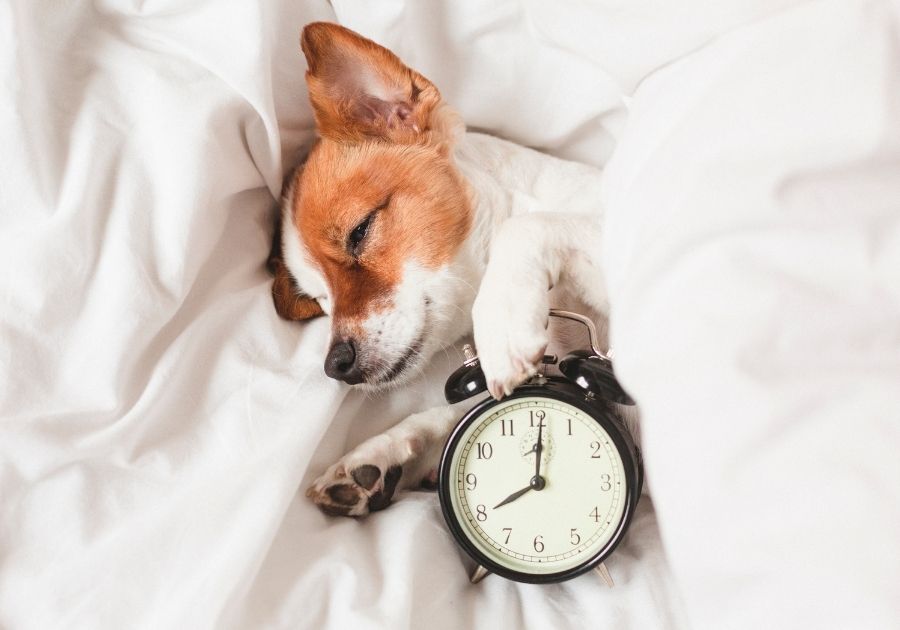
According to some research, dogs averagely spend 50% of their day sleeping and 30% of the rest, awake but relaxing. [2]
As a pet parent, you must understand your dog’s sleep cycle and keep track of it for the good of its overall health.
We’ve gathered some crucial information that’ll help you know your dog’s sleep routine.
What Is Active Sleep (Rapid Eye Movement)?
Before this subheading, we’ve discussed dogs vocalizing and moving in their sleep — this phenomenon is called “active sleep” or Rapid Eye Movement (REM).
Although these occurrences are completely normal in canines and might look cute initially or disturbing if frequent, they may also be a sign of unsound sleep.
Your pooch will likely jump on alert at the drop of a pin and might stay awake longer before drifting back to sleep.
While naps between humans and dogs may differ, both mammals share a similar sleep cycle at night.
Like humans, dogs get the majority of deep sleep between 9:00 p.m and 6:00 a.m.
Their bodies and minds transition between wakefulness, drowsiness, light sleep, and REM sleep — the latter phase being characterized by flickering eyes, twitchy legs, and dreams.
You might notice your dog springing up on all fours from sleep.
However, you should in mind that it’s nothing to worry about as dogs tend to wake abruptly after a period of deep sleep, unlike humans that experience sleep inertia.
How Does Feeding Routine Affect Your Dog’s Sleep?
The effect of food on sleep should be tagged “criminal” if undermined.
A report that highlighted the importance of feeding in a dog’s sleep cycle using actigraphy in adult dogs fed once or twice daily, revealed that dogs fed twice tend to have a healthier sleep routine, including less often but longer naps, sleeping earlier at night, and deeper sleep than dogs fed once a day. [3]
What Role Does Comfort Play?
You’d rather cuddle pillows on a king-sized bed with a comfy mattress and velvet duvet than stretch out your aching back on a wooden bench.
Similarly, your canine companion desires a quality bed, which may require that it snuggles with you on yours.
The location your dog sleeps and the atmosphere surrounding it also determine its sleeping routine.
Dogs aren’t nocturnal; as such, they prefer sleeping in a dark, comfortable, and cool place.
Changes in Sleep Patterns
As we mentioned earlier, there are slight differences in sleeping patterns between dogs of different ages.
Middle-aged dogs tend to have more quality sleep than puppies and older dogs.
During REM, the pons — a part of the brainstem that regulates sleep cycles controls large muscles moving when animals dream.
Puppies and older dogs tend to have underdeveloped and less efficient pons.
As your dog ages, you should take note of changes in sleep cycles that may include:
- Not waking up to sounds or stimuli.
- Sleeping in different locations, some of which may seem absurd, like closets.
- Experiencing pain and discomfort during sleep.
- Sleeping while sitting up or standing.
- Sleepless nights and restlessness in the evenings while acting confused.
Be Observant
Knowing your dog’s sleep cycle without keeping track of it is like carrying water to the sea.
Please keep track of your dog’s sleep routine to determine the frequency and quality of its sleep.
A higher proportion of daytime resting suggests that your dog’s welfare has improved. Inadequate sleep or oversleeping might be a sign of a medical problem.
Therefore, we encourage a chat with your veterinarian if you notice any imbalances.
What Should I Do When My Dog Barks in His Sleep?
It’s only spontaneous for you to tap your dog whenever it barks in its sleep, but vets and animal behaviorists disagree with you.
Their advice is to let your pooch continue its sleep even though it’s barking in its sleep.
Sadly, you may realize that your dog is having a nightmare, but it’s best to allow it to get through the nightmare as it can be befogging to wake a dog from a deep REM or non-REM sleep.
In extreme cases, your pooch might subconsciously chase inanimate objects around the house, waking up as if nothing happened due to REM Behavior Disorders.
It will be best to visit the vet at this point.
Do All Dogs Bark in Their Sleep?
Any dog can bark in its sleep regardless of breed, size, or age.
Since sleep-barking is usually harmless and completely normal, you should expect any dog to bark in its sleep at some point in its life.
While dogs dream, barking isn’t a universal occurrence in their sleep.
Small-sized dogs dream more often than larger breeds and tend to be more vocal and dramatic in their sleep.
Similarly, puppies and older dogs tend to bark more in their sleep than middle-aged dogs.
What to Do When the Noise Bothers You
Judging from obvious facts, your dog’s barking and growling might startle you or other members of the household while you’re deeply asleep.
However, there is something you can do to control your dog’s sleep-barking if it happens frequently and you have sleepless nights as a result.
A resounding warning should be never to prioritize medication except in extreme cases where vet-prescribed sleeping pills should be given.
The best thing you could do to limit the impact of your dog’s bark or growl while sleeping is to place the dog’s bed far from other members of the family.
Recommended:
Do Dogs Get Tired Of Barking? What You Should Know
Should I wake my dog up if he’s barking in his sleep?
While it may be tempting to wake your pooch when it barks in its sleep, especially if it’s disturbing, it’s best to let him get through his dream or nightmare.
Jolting your pooch to reality from its Rapid Eye Movement or non-REM sleep might end up disorienting it.
Do Dogs Dream?
Dreamland isn’t visited only by humans. Researchers say that most vertebrates can dream and do so regularly.
Like humans, our canine companions experience a period of Rapid Eye Movement (REM) sleep where they dream.
What do dogs dream about when they sleep?
Dogs, like other animals, can remember and replay events that happen during their active state.
Researchers at the Massachusetts Institute of Technology (MIT) suggest that animals like dogs have complex dreams.
As such, your pooch may dream of chasing rodents, a soothing massage, or a terrific nightmare like losing a fight to another dog.
Final Thoughts
Before this article, you might have worried about your dog’s health or jolted it to reality.
However, you’d be less bothered about this perplexing occurrence after digesting the information in this article.
You’d rather change the location your dog sleeps to somewhere its bark wouldn’t affect other sleepers instead of worrying about an emergency visit to the veterinarian.
Remember to use a vet-prescribed medication only in extreme cases of sleep-barking, perhaps with old dogs experiencing changes in their sleep patterns.
You May Also Like:
Why Do Dogs Sleep With Their Bum Facing You?
References & Notes
- Psycology Today: “Dogs and Humans Have Similar Social and Emotional Brains”
- American Kennel Club (AKC): “Should I Let My Dog Sleep Late Every Day?”
- Journal of Veterinary Behavior: “Characterizing behavioral sleep using actigraphy in adult dogs of various ages fed once or twice daily”
Featured Image by Danedeeso

